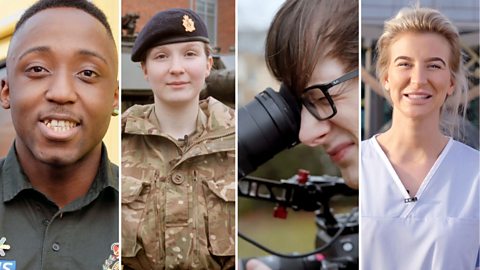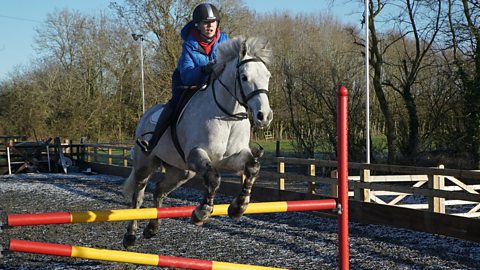To celebrate National Careers Week 2022, Bitesize Careers have put together a special panel to discuss careers in sports.What's it like to work at Aston Villa FC, Southampton FC and British Cycling? Scroll down to find out!
Visit our Q&A panels collection where you can also watch career discussions on healthcare and science, media and journalism, music and arts, and technology.
Sports panel discussion with Max Whittle
Max Whittle talks to four people in the sports sector. They give insight into potential options available to you when you've finished your education, and reveal their top tips for getting a foot in the door. They also discuss challenges they have overcome and what the future jobs prospects could be for their sector.

Max Whittle is a sports presenter, reporter and event host. He studied Sports Journalism at Solent University in Southampton. He has worked for a number of broadcasters such as BBC, talkSPORT, Sky Sports and Amazon Prime.
Meet the panellists
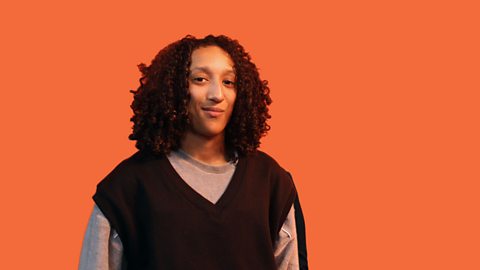
Renee Gottshalk, Aston Villa FC
Renee's a football coach for Aston Villa women's team. She became an apprentice at Aston Villa Foundation in 2018 after completing her college studies.

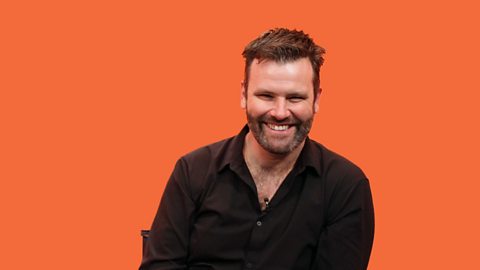
Phil Burt, Phil Burt Innovation
Phil's a former physio and current ergonomist. He studied Physiotherapy at University of Manchester, and worked with cyclists at three Olympic Games and seven Tours de France.

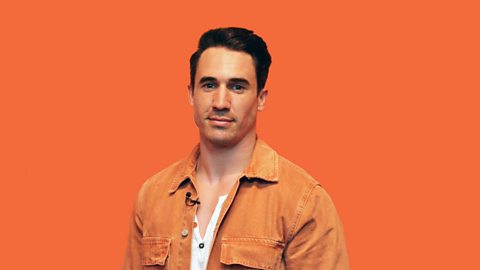
Josh Patterson, TheRunBuddy
Josh is a former rugby player. He is co-owner of TheRunBuddy – an app offering personal fitness training. In 2021, he completed four marathons in 24 hours across the four nations of the UK.

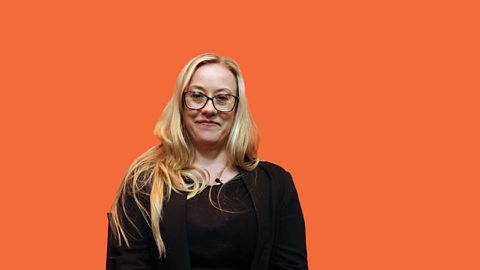
Amy Spencer, Southampton FC
Amy's a sport psychologist at Southampton Football Club. She has a master's in Applied Sport and Exercise Psychology. She also hosts a podcast about demystifying mindfulness.

Intros and how it all started
- How would you describe your role?
- What sort of day-to-day tasks does your job involve?
- How did you first get into your industry?
Max:
We are here today to explore jobs in sport. I'm a sports presenter, reporter, and commentator, I've worked with the Premier League, Sky Sports, Amazon Prime and Team GB, covering an array of events and interviewing some of the biggest names in the sporting world.Thankfully though it's not just me joining you today, we have some great people to help us explore sport and the various jobs within the industry to give you an insight of what might be available to you when you leave school and hopefully give you some career inspiration so, shall we meet them.It's my pleasure to introduce Renee, Phil, Amy and Josh.Well let's get cracking first of all with who you are and what you do. We'll start with you, Renee.
Renee:
Thank you, my name's Renee Gottshalk I come from the Aston Villa Foundation which is the charity that works with the Aston Villa Football Club.
They decided to work in the community bridging the gap between barriers with education, opportunities to play sport for young people, the elderly, adults in general.
And this is something that has been done for a couple of years in partnership with the Premier League and they have provided some funding for us to run some amazing programmes, targeted community groups as well, so that's a little bit about me.
Max:
Thank you Renee and Phil, what about you?
Phil:
I'm a physiotherapist and I've worked in sport for about 20 years now. I worked in rugby initially but the main part of my career was working with British cycling across three Olympic cycles helping set up Team Sky, won the Tour de France with a British guy for the first time. I now run my own business where I help people achieve their dreams on bikes and make better kit, for example, shorts that help you sit on a bike in more comfort.
Max:
Haha I need a pair of those. Amy, over to you.
Amy:
Hi I'm Amy Spencer, and I'm a sports psychologist at Southampton Football Club, and my main role is working with 18s and 23s, and those transition players going up to the first team.
Max:
And last but not least Josh.
Josh:
I am Josh Patterson I am an ultra athlete and a business owner. I create tailored plans for all types of runners.
Max:
So a big variety of roles. Renee, we'd like to know exactly what these job titles mean so let's start with you and what you do with Aston Villa.
Renee:
So, my role entails me working in the community, long days, long hours as you can imagine, but delivering sports, educational stuff. We like to engage the young people in things that relate to them and their communities, sometimes in deprived communities, offering engagement, so offering them an opportunity to come and use their youth voice, work on themselves, and exercise as well. Feel good about themselves, learn something, and get them off the street and maybe troubling spaces and environments as well.
Max:
Now to find out more we've actually got a short clip to show us exactly what you do. Surprising face there, let's have a look.
Renee:(VIDEO)
My name is Renee Gottshalk and my role is the Interventions Women's Coach where we work with young girls, adolescents right up to adults within the community around healthy goals and initiatives within sports. Change makers and the funding that is given after every goal the ladies score within the league is amazing, it gives them the opportunity to do that and have the positivity to make sure that that money is given to where it's needed. Young women have an ability to develop within themselves, within their voice, and their empowerment of that. By allowing them to embrace this on sessions we give them a space where they feel safe to be who they are.
Max:
So what were your first steps into this role? That's something that everyone's so intrigued by.
Renee:
I have so many stories from working on the sessions as like a referee volunteer, right down to trying to play and being a goal keeper, getting balls blasted at me by all sorts of lads, from all sorts of different clubs and experiences at sport. I also went and worked with young people, tots as well, so kids from ages one, two and three right up to age seven in I'd say nursery environments and schools as well, and I've been to youth club spaces as well and worked with them. And I think that's the main aspect of my introduction to this child development. Learning about what a young person needs from the world, and how we can use sport to deliver that to them as well.
Max:
Thank you, Renee. Over to you, Phil, can you tell us what you do please?
Phil:
Well, I suppose what I do now - if I backtrack a little bit I'm, as I said I trained as a physiotherapist and then I was a physio for the British Cycling Team at three Olympics, helped set up Team Sky.And I became, drifted away from the day-to-day care, my order of the day was looking after and making sure the athletes are ready, you know, that they're fit enough and strong enough to do what they need to do and keeping their bodies in piece but I became part of what some people might know, have heard of called the Secret Squirrel Club so, where we came up with interventions and technology advancements that helped to give us the famous sort of marginal gain's edge on other, on competitors. I've since, and did that for 12-15 years and now I work, I have my own company like Josh and basically we help people realise their dreams on bikes but work with companies to make better cycling products, for example things that don't hurt your bum as much.
Max:
Phil we've got a lovely picture of you here with Sir Chris Hoy, this might be your biggest achievement to date, actually managing to get an Olympic champion on your shoulder.
Phil:
Yes, that was in London 2012, what a time yeah and that's when Chris had just become the most successful Olympian ever.
Max:
But they're not all like this are they, as you say you run your own company so it's working with topflight athletes but the general public as well.
Phil:
Absolutely I would say, making those people like Chris one or two per cent better can be the difference between winning or losing. But I quite enjoy working with mere mortals like us, cos sometimes we can make those 30 to 40 per cent better and if that means somebody is keeping fitter and healthier and happier, that's a great thing to be able to give to people.
Max:
We've got a clip from your YouTube channel as well just to show us more of a glimpse into what you do. Let's have a look at that.
(VIDEO)
Phil: Right remember what we said, that right leg wants to come in, how does it feel?
Katy: Fine.
Phil: Yeah?
Katy: Good.
Phil: Do you like them?
Katy: Yeah.
Phil: Does it a feel more fluid than normal like, remember the analogy of being on an ice cube?
Katy: Maybe but I think that's cos of the flow. Yeah. I don't think they feel, I don't know, cos you'd said that, I thought they were gonna feel worse -
Phil: That's great, well that there is a very strong indication that you're gonna get on well with them.
Max:
So Phil, the NBA star LeBron James famously spends over a million dollars every season on maintaining his body. It's very important as we just saw there, what are you doing in that video? I think I heard the term ‘ice cube’ as well at one point.
Phil:
So that was with a YouTuber called Katie Kookaburra and basically we were setting up and explaining to people. So in cycling the interaction between the equipment and you is really really important. I worked that out when I came to British Cycling, couldn't work out why people were getting injured. If you think about when you run you only have really your trainers in contact with the ground, cycling five different contact points.There are special pedals called speed plates, when you put them on they have loads of float which means you can put your feet anywhere so they feel like cycling on an ice cube, but they're very good at preventing injury and accommodating people who have got slightly different biomechanics. So that's where I work now I work in this interface between a human being and a hard machine, which is what ergonomics is really.
Max:
How did you first get into the industry, Phil?
Phil:
So, um, lucky-, luck! I was in the right place at the right time. I qualified as a physio back in 1999 and worked in Australia, New Zealand, landed back in the UK, didn't know, came back to what I knew here in Manchester where I qualified and I was very lucky that a job came up in rugby at Sale Sharks. I was in the right place at the right time. But I learnt so much, took the opportunity and decided to absorb everything I possibly could. I often look back on my career and think I was very lucky and people look at it, I've rode crests of teams that were doing very well. If I was a small part of that then brilliant. I wasn't all of it though.
Max:
Be in the right place at the right time and create your own luck.
Phil:
Exactly.
Max:
Amy over to you, what's your job and what does it entail?
Amy:
So I'm one of the sports psychologists and Southampton Football Club. My main kind of role within the club is helping players develop confidence, motivation, being able to manage pressure, and ultimately just looking at the mental side of the game.
Max:
Working with footballers day-to-day in this field, what's that like for you?
Amy:
Unbelievable, absolutely love it. Like my experience has been amazing.
Max:
So paint a picture for us, a typical day for you at Southampton Football Club.
Amy:
A typical day is… I don't think there is a typical day, it's always very different - very different. I work with one to one players, I work with units so like the defensive unit, the attacking unit. I work with group, like the team, so team unit sessions. Work with the multidisciplinary staff, so it's not only coaches, that's sport scientists, S&C practitioners, physiotherapists, analysis staff. So looking at the whole kind of collective's performance support, all enabling us, not only the players but the staff to achieve optimal performance and then reach those higher levels that we want to.
Max:
And speaking of those sessions we've got some photos of things going on in your day-to-day job. And they're not just asleep here are they, Amy?
Amy:
No no no they're not, they're not asleep. So I'm actually specialising in mindfulness so I'm trying to embed mindfulness into the culture of football. And what I've been doing here is looking at a body scan, so a typical body scan where you kind of focus your attention on different parts of the body, and being able to anchor your attention. So, being able to learn a skill like mindfulness and being able to centre themselves is a really important skill to achieve performance.
Max:
One of the fascinating things you've said about your role is when they're training you're actually looking out for certain things, triggers, to then take with them to the workplace so what are you looking for during those sessions?
Amy:
Yeah so I'll go out and observe training and I'll go into their matches, I'll go into the changing room at half time listening to the coach and their communication, seeing how many cues the players are picking up on. In terms of the observation out on the pitch and training, it's looking at kind of their emotional reactions, whether they're too deep in their thoughts and that's affecting behaviour which is then ultimately affecting performance. So, it's kind of all of these things that you're triangulating to bring together to build a bigger picture.
Max:
So how did you get into this industry?
Amy:
I went down to Southampton and spoke to the head of sports psychology, "Can I have an internship?" and he went "No."And so I went off, got my master's, because he said, "Go and get your master's."Got my master's, came back, and then said to him, "You've got to give me an internship 'cause I went off and got my master's."So I then did two years unpaid as an intern, then part time, and then full time they've taken me on full time and I've now been at the club for 10 years.
Max:
And you got your 'yes' in the end.
Amy:
I got my 'yes' in the end, yeah perseverance.
Max:
Thank you, Amy. Last but not least, Josh. I see you got the memo, by the way, BBC Bitesize, the orange background, we're loving the shirt.
Josh:
Thank you, on brand.
Max:
So what's your role, Josh?
Josh:
So, in terms of my job role I would say I've just been on this journey where I probably didn't even really know what my job role was, I kind of keep stumbling on different things. I think I've kind of connected my passion for people and just my love for sport and the synergy between the two and what sport can enable anyone to do no matter what adversity that they're facing. And so, I've always wanted to create a platform off the back of the things that I do where we could support and inspire others to do the same as well. Because I think the biggest issue in life is people's environment. I think that's their limiting factor so if we can create a space or that environment for them, no matter what idea they may have, we can enable it and support them, you know, ultimately to go on and do it.
Max:
Yeah, Josh, thank you for sharing that story and if anyone out there has ever wanted to see you in a helicopter, this next clip is for them.
Josh: (VIDEO)
This is it. On May 29th I'm gonna be running four marathons in the four countries of the United Kingdom, but here's the catch. I have to run them in 24 hours, and not a minute more. This is gonna be a world record first. And one of the hardest challenges I have ever done in my life.
Max:
So, Josh, let's just clarify: you didn't like running just a couple of years ago, and now we've watched that.
Josh:
Most of the time when I do them there's a foundation, a charity, that we're trying to raise money and awareness for. And for me, for this particular one, we were doing it for a mental health charity where, you know, the narrative was 'not to give up'. So no matter how much pain I was actually in, and I was in a lot of pain on that particular one, giving up just wasn't an option to be honest with you. You know, we are trying to inspire a generation to think different and be different.
Max:
That's great, and before you set up the business, before you started running, you had a very varied career, what were your first few steps after you left school?
Josh:
So, when I left school, I went into rugby for four years, I lived in London for a couple at a young age, and then moved over to Northern Ireland where my family are from. It just got to the point where my passion was rugby but I think the more of it I was doing the less in love I became and I think actually the external influence is what really put me off it. I think it was one of those things where if you performed well everybody was your biggest fan, if you perform poorly, even just one game, the knock-on effect from that for me just got to the point where I was like, "I just don't really want to live life like this" and so, I switched off from that but still had a passion to be in - 'in' sport.
I’ve connected my passion for people and my love for sport. It’s the synergy between the two and what sport can enable anyone to do no matter what adversity they’re facing.
Josh
Career experiences
- Did you know what you wanted to be when you were at school?
- Were there any subjects which helped you in your career?
- How would you describe yourself and how does that make you good at what you do?
Max:
Right let's take a journey back in time. I have to say to the audience, that is actually a picture of me barber-less but with class, no hairdresser to be seen. I was a very competitive person at school, always around a sports environment. Didn't know where the hairdressers was as I said, but I did know I wanted to work in the sporting field in some aspect. I think at this age it was certainly more sports management. I think I had fairy tale designs in school classes of what my gym would look like at certain points.I didn't want to work in the media at this point but you never quite know where you're going to go, I certainly loved reading and watching about sport. Guys, how about you, did you know what you wanted to be when you were at school? Josh?
Josh:
Do I know what I want to be? Prob- look, that's why I said I'm on this journey where I keep discovering new passions. And so, just don't panic, you know, it's okay not to know what you want to be. You know, it takes time and I think with life experience, travelling, meeting people - that's when I think you start to find your identity and hopefully the passion that you may have to go on and do something.
Max:
Amy, how about you?
Amy:
Ha, the answer's again no, all I knew was that I love sports. I went through a phase of wanting to be an athlete, I wanted to go to the Olympics, I wanted to be a sports presenter, I wanted to be a PE teacher, and actually being a sports psychologist was the last thing on my list. But it was only the passion of sport and actually my BTEC that sparked my interest in sport psychology.
Max:
So two for two in terms of not knowing what you wanted to do at school. Phil, for the hat trick?
Phil:
Not a clue. [laughter] It's finding that, I would say to people watching this just relax, be kind to yourself, if all - I doubt anyone really will tell you, and I think they're lying if they tell you at 18 they know what they're gonna be for the rest of their life because, we're a little bit arrogant as human beings if we think we can control all these events that are just gonna happen to us. When things land and these opportunities that so many different people have had, that when those opportunities arrive you're in the position to take advantage, as you were with your brilliant elocution and speaking skills when media came calling.
Max:
Still don't know how I'm here, Phil. Renee, how about you?
Renee:
So I went to college and I did sports despite having like a music kind of interest as well, I love performing arts. I DJ - my dad's a DJ as well - so I come from a very rich musical cultural background, um, and I went off the rails and decided sports because again, a desk is still somewhere in the studio, so I had to get outdoors. And I went to college and I played for a football team, I played for Blues, at the same time on the development squad I was studying but I completely hated the pressure of being new to a team at such an older age where they'd discovered their needs, their understanding, each other, they know the game, they know their priorities individually and collectively, I didn't fit in. So I dropped back out of college, I asked for the apprenticeship at the Aston Villa Foundation which is there when I found the opportunity to give back to people in what I was struggling in. And that was the whole journey of not knowing until… you knew.
Max:
It comes down to following your passion [Amen!] and what you're good at and I wanna see some more DJ'ing from you at some point okay? You've all ended up in the same field - it's fascinating - and I know that a lot of our audience will be soon taking their GCSEs and National 5 exams so we wish them all the best of luck with that. And speaking of GCSEs, Amy were there any in particular that really helped you in your career now?
Amy:
I keep coming back to PE, and I just think PE has been the driving force for me, I loved my PE teachers, any chance, a bit like what you said any chance I could get outside I was outside, hated being inside. So, actually for me it was following my passion, and I think we've all spoken about kind of passion and desire and that was it, that was key for me so PE was my main subject.
Max:
Josh, what was your favourite subject?
Josh:
I think Drama, Drama was a great…subject for me in terms of expression. And I think the teacher as well. I think the more the teacher nurtured you and the more invested in you they were, which you have to be, to be a Drama teacher, the more I loved the subject; other subjects maybe not so much.
Max:
Renee, back to you.
Renee:
I loved all my subjects, literally. I think the only subject I didn't like was Maths, and that's because no matter what if I didn't write it out I wasn't getting the mark. I loved to just speak the answer and just say Miss yeah I know the answer but for me, I challenged myself when I was having my exams as well and my panic attacks to really understand what I'm trying to say. I got six As and two Bs with panic attacks for like the first two weeks of exams, I was so happy, and I think at college it gave me that determination to say if I did this and I was panicking out of my skin, what can I do if I really put my mind to it? If I allow that drive to not be, "I want to be that person, I am that person" - that determination to become me.
Max:
And finally Phil?
Phil:
I had two great teachers, picking up on what Josh said, but I think teachers inspire people and I was lucky enough to have a brilliant Biology teacher, or two, and a Chemistry teacher, literally Mr Sleep, he was mad, he used to set fire to things every day, blowing things up. But it really answered that, if you ask why enough you end up at the molecular level basically, so that's why I got really engaged with that. But I have to say, one of the things is that - we've all talked about - IQ today or exams and that is the world we have to go through that process, it gives us the building blocks to go on in society. But the people I've learnt most from are those who have amazing emotional intelligence, and there is some weird connection there that, isn't there some strange fact I think that… more percentage of millionaires have a higher emotional intelligence than they do IQ, and never discount the emotional intelligence as well, which isn't necessarily packaged together in an exam format, you know. Something that we all learn through life just by bumping around and having friction with people.
Max:
Well to everyone out there, again, best of luck for all of your exams. Now on the BBC Bitesize website there are tonnes of videos and explainers for all the subjects you study at school. You can log in and track your progress with revision and test your knowledge with quizzes, so it's well worth checking out. We've learnt so much so far about the variety of your jobs, and I'm sure guys you get to work with so many different personalities, so many different characters so I ask you, how would you describe yourself and why does that make you good at what you do? What a question! I'll start with Renee. I didn't write that did I?
Renee:
How would you describe yourself? I think it's the hardest question out there, you know, explain who you are, put yourself out there in words, um… I think there's too much, there's too much to break down, to kind of explain who I am in a nutshell, but I think that's definitely something that I can say I portray. I like to show that exuberance, that I guess what brings light to who I am and my name.What I go through is no other like anyone else's life style and I think that's what makes you individual so, holding on to that.I would describe myself as being outgoing only in the simple fact that even in an introverted environment where everyone's quiet you'll still catch me, you know, just rocking over there, I'll be like hi do you wanna listen? You know, I'm very, er, welcoming as well in nature. I think there's an importance to have maybe that drive as I said that warrior mentality, and so I would say I'm courageous, I'm competitive. But I would also say there's a time where that warrior needs um, help, needs someone to go back to, so I'd say a mothering, nurturing as well, I really do like to help people, um, so that's a little bit about me, thank you.
Max:
Nice, we know you now Renee. Josh?
Josh:
And I'm a very empathetic, very passionate, um… yeah, a very passionate person, um… and kind.
Max:
Nice, Phil?
Phil:
I'm quite a shy, retiring person. I was very shy when I was younger, and therefore I am quite empathetic as well but because I want everyone to be happy. [chuckles] And so I've worked out ways of trying to make that happen and why, I've just got to say this, um,I don't like barriers, and I like cutting through all the barriers sometimes, whether that's people making things over complicated or sometimes I don't know maybe the class system putting barriers to people achieving what they want to do, just because you came from this environment you've not been able to do that. I really, really dislike that stuff. And hence why one of my chapters in my book is called Myth Busters and it's about, you know, dismissing myths that you don't need to, you don't need this and that to do this within cycling, you can do this, you know, trying to convey that right information so everyone can enjoy themselves so, I think you have to ask her who I am really, [laughter] cos I don't know.Can I book a session or -
Max:
We've only got five minutes, no Phil. Amy, and finally how about you, how would you describe yourself?
Amy:
That's such a difficult question isn't it. I'm gonna come back to what you said Phil around the emotional intelligence because I think…actually when I describe myself I'd like to say I'm quite a highly emotionally intelligent person. When I speak to players regarding kind of their super strengths of what are they gonna use in order to achieve optimal performance, I always kind of refer back to myself that I always feel my super strengths are my softer skills. So that empathy, the being able to listen, um, and it was (chuckles) as you were all talking a thought came into my head of one of the players described me as a chameleon, that actually I can fit into all different kind of environments, and I think that's a really quite nice way to kind of describe it.
Max:
Nice.
Relax and be kind to yourself. I doubt anyone aged 18 will tell you that they know what they will do for the rest of their life.
Phil
Future of the sector & audience Q&A
- Where do you think the future will be for your sector?
- What advice would you give to your teenage self?
Max:
Sport, like a lot of other sectors, guys, it is a fast-moving industry and technology has such a big impact on that in terms of getting athletes' physical and mental levels to the peak. It's always changing with technology. So with that in mind, where do you think the future lies for your industry, particularly with our audience that are gonna be applying for jobs in the next few years, Phil, I'll start with you.
Phil:
Right it's gonna be data, full stop, end of story, and there's too much data if you ask me. But I think the next level in the evolution of human beings will be how to sift through data and work out what is meaningful and what is not. Cycling especially, I mean you're a runner, Josh, football, we track all footballers these days and cycling is obsessed with it cos we can measure so many different things. But most importantly, what is it? What in that data is important? I think that moving forward we will only be able to measure more and more things as the wonder of technology and computers advance and become stronger but I think it will be that, what does it mean? How, and then how do we explain that to somebody? You know, so, I think that… I've heard theories that the ability for human beings to adapt quicker is gonna be the next evolutionary step change in how happy we are and how successful we are and we can definitely see that because, working in cycling we used to have a thing that's called, what we call "What it takes to win?" models where we try and nut down the one thing that we needed for somebody to win a medal, what would be the one thing that they haven't got that they need? That's actually quite hard to work out sometimes because, when you're an athlete it's quite easy because you have a big support team around you, a physiotherapist, psychologist - But you're out in the world and you just go, I'm gonna run a marathon, or I'm gonna try and pass these exams or try, you know, you have to work it out yourself, and then you're faced with what the marketing in front of that which is just, half of it… is marketing, it's not true - they're trying to sell you something that you may or may not need or, so your dream… you may not want. So I think it'll be how we interpret data.
Max:
Amy, Phil wants me to ask you what the future holds for him, but I've got to ask you about the industry at this point what do you think?
Amy:
Um… for sport psychology I think we're - it's very exciting, I can't wait to see where it goes, there's more research coming out about it, there's more papers being written, like the data. But there's more interactions with humans and kind of understanding human behaviour that's coming out and, I think sports are now latching on to kind of the use of sport psychologists, especially within football I mean when I started ten years ago I think there was about two of us full time within professional football, um, and now every Premier League kind of cat.1 club has a sport psychologist, or a team of sport psychologists and I just, I can't wait to see where the field goes.
Max:
And we can't wait either, Josh, how about you?
Josh:
Yeah I mean I'm really excited for the future to be honest with you in terms of like the scalability, you know, right now we predominantly focus just on running, but in terms of the communities that we can start to invest in and support, it really is unlimited, to be honest with you. And even communities that have maybe been neglected in terms of like investment funding, um, yeah the space, I mean I truly believe just with the three minds that we have and the passion that we have that this will become the number one platform globally without a doubt, it's just a case of how many years it's gonna take us to get to that point and, things like data is just gonna be so valuable to that. But also I think the individuals that you have within the team too. I think where I'm very grateful is that - there are a lot of things I'm great at, there's a lot of things that I'm not, but I think having these minds come in with different backgrounds, experiences, ultimately is what's gonna create this platform to become that number one - hopefully - that we believe it can be.
Max:
We'll hold you to that prediction. Renee, finally.
Renee:
I think, um, from my point of view being in the community a lot more rather than I guess the performance side, um, hundred percent agree with you with data. I definitely think there's way more interactions than ever, hence my role being created, Women's Interventions. It was never a thing for women's or men interventions you said, you know, you've grown a female dedicated department within your industry so I think, there's a lot more relation to applying the data to where it fits in the community and in the gaps, to actually bridge the gap as we've made that transfer over to data that is monitored by systems, using these systems working with methodical kind of computers that can give us that real life information as quick as possible. However - there's gaps, and there always has been gaps and there still is gaps isn't there? So the way in which that's changing is that we are bridging the gaps slowly between our use of technology to better human interaction and human experience. And then also using human experience in relation to the data, and how we are using it to affect these people, using the feedback over time it will get us to manage that data and have a relationship with data management and assessment a lot more stronger, again meaningful. And I think the way in which that will leave us then is having a lot more sports that are inclusive-based, not maybe performance-based. So the Paralympics, they're thriving now in all different sports and being able to provide people who may not be able to perform at an elite level or amateur level an experience or a taste of sports despite disability, despite mental health, despite any barriers that they might face physically. Cool - mental emotions, barriers inside, that's what we're hitting now. Um, those key groups that we like to work with that are being missed within the system of data, they're actually being targeted. So we're going back through the data thinking, okay, where are we missing this, what numbers aren't adding up, and how can we actually produce or multiply or maximise our engagement within this area, this field? But I do think that we'll have a much more connected relationship with ourselves, exercise, and the sporting industry in general.
Max:
Final question from me, Josh, I'll start with you, what advice would you give to your teenage self?
Josh:
Simple - I would say, be kind to yourself, be passionate, and remain ambitious throughout.
Max:
Great stuff, Josh, and what about you, Renee, what advice would you give your teenage self?
Renee:
Not far from being a teenager myself, only a few months, um, but I will do my best. So looking back, that person was very carefree, and I think that's a main objective to have in school years as well: to have a willingness to succeed, to want to take the ownership of, you know, the exam pressure, and managing the different teachers and the different subjects, you know, that idea of being in control, they want to see you do that. So I think that's something that you need to remember, always going through that academic phase in college, university, wherever - when you're being assessed for anything - is to have that care and drive with that and take that with you wherever you go. I'd definitely say to lean on those people that are around you that really, really care about seeing you succeed and achieve all your dreams and goals. And finally those dreams and goals: they have to be realistic. Um, when we say 'be realistic' believe in them and speak them into existence; as much as speaking you'll manifest them, have notes around the room or give yourself cue cards and reminders. I have something on the back of my phone, it's just literally a photo, a picture that I was able to print out one of myself and one of the colleagues that kind of came up through the role, um - similar way to what I did - for an apprenticeship and whatnot, and it's just a reminder that I've changed someone's life. And I think we need to give ourselves that virtue as well of acknowledgement and I think a little bit of appreciation and gratitude as well for how these two legs have carried you to be here. Er, that's definitely something that I'd say to my younger self.
Max:
Phil, who am I coming to next? [Phil chuckles] Yes it's you.
Phil:
I would say don't worry, relax, life is gonna happen, the sun is gonna come up tomorrow. No matter what happens today, how bad, how good it is, tomorrow's another day and, I wish I'd known that when I was younger cos I just stressed too much about certain things, got myself in such a panic about certain exams thinking that that was the most important thing ever so, I would say just be - again the words have been said: be kind to yourself, you know, the world - the sun comes up again tomorrow, no matter how bad you do today.
Max:
Even in England right?
Phil:
Even in - even in Manchester now and again!
Max:
Amy, what about you?
Amy:
Just, I think, work hard, stay true to yourself and believe in yourself, and ultimately have fun. Like you've got to have fun in whatever you do.
Max::
Okay that brings us to the Q&A segment of our session, we've had a question sent over in advance for Renee from our fabulous audience and it's from Roisin.
Roisin:
Hello, my name is Roisin Cunningham, and my question is for Renee Gottshalk. What advice would you give to any aspiring young athletes?
Max::
Over to you.
Renee:
Great question.
Max:
It was, thank you.
Renee:
Aspiring means they have the drive. Keep it, don't let it go, let it be your motivation every day in the morning, um, and that doesn't mean just in your head, manifest that into your environment. The amount of things that you put on your wall about other people, famous people, that's fine, it's the qualities you relate to and you have those qualities to again believe in yourself. Believing in your judgement - as you said we know more than we realise - is key, is key, is vital, so yeah definitely trust and believe in yourself, and lean on those who are looking out for you.
Max:
Thank you, Renee, and thank you for that great question, Roisin. I've got one more for all of you so for people that want to get into this industry, what would your top three tips be? Josh, I'll go to you first.
Josh:
Yeah I think you have to find what's gonna make you stand out from the crowd, I think too often we probably try and replicate what's been done and that's fine but, you've got to understand what your narrative is because ultimately that's what's going to inspire someone to want to work with you or employ you, I believe, um… Yeah, I think that's the big one for me, it's telling somebody something that they've never heard before, you know, it's that fascination I think that entices them to like want to connect with you on a bigger level.
Max:
Thank you, Josh. Amy, what would your top three tips be?
Amy:
Top three tips, um… I think the first one would be, be aware of what you're going into, I think sport is seem, seen as kind of this glamorous, this glamorous thing that we go into, but it's also, there's a lot of hard work, long hours, I think everyone's kind of said kind of what it is so just be aware of what you're going into. Um… my second one would be… well, stay true to yourself, like be aware of what you want to achieve and go after and achieve it. And yeah I'm gonna leave you on that one so two, two top tips I'm afraid.
Max:
Two's good enough. Phil, can we make it three from you?
Phil:
Let's have a go. First, she's absolutely right and firstly be aware that sport is not everything it's made out to be right? It is, sport is this, um… it's this separation from reality that we all enjoy because we can go out and we can express ourselves when we playing but then we can watch it at the weekends and we see people there, but it's a break from mundane graft and friction of everyday life. And actually working in it though it's just as hard as everything else so it's not glamorous, and the best way to do that is just to spend time, I mean what you did in terms of going and making sure, being told no, going away, going and doing it, and going back, fantastic. But I think when you did that you went in and looked at it and said, no I still want to do this. So if you get any chance of shadowing, going into it, and it might not be for you then, just going in and going well actually that's not what I thought it would be, it's not what I want to be, you know, just those things. Top tips, perseverance which many of the panel did say, you generally have to have that because there aren't - sport isn't a career pathway like medicine where you get to here, you get to here, you get to here and that job will be there - you have to be in the right time, as I described myself been lucky. But if you persevere, look at those attributes, and I think the main thing is, I think we don't, um… we don't recognise the importance of human skills and emotional intelligence as much as Josh mentioned standing out so, lots of people have loads of As now, A-level and things like that, but why am I gonna employ you, why am I gonna accept you? It's probably cos I've got some of the skills that she recognises as being quite good at getting other human beings so, invest in that, don't discount it. It's a soft skill, but they're sometimes the most important.
Max:
And look at this, it's been teed up perfectly for the final word, Miss Aston Villa. Renee, what would your top three tips be?
Renee:
Um, two - two things about self belief and trust that I mentioned were again don't close doors on yourself cos other people will do it for you, so that means you're your own driver of your future, you make your experience of this life, day-to-day as well. Er, I think that plays a little bit into performance with discipline, and having an overall comprehension for the team objective, so, having a collective passion, you know, being prideful in your presence within a team environment, and being able to recognise and acknowledge those responsibilities collectively, and play into that role by focusing solely on what you need to do. And that takes a lot of trust in your abilities, believe in yourself. That's kind of like two tips in one, but the one main thing that I think we need to remember as young people, as adults within the sporting environment is, failure is inevitable. Two teams. Competition. A and B, what's going to happen? We'll have one winner, but we'll also have one loser. That losing team I'm scared of what they will come back like, all it is every week, and that's what we have to remember, there's always tomorrow, we'll always raise our heads, um, but we have to remember that again: fail, fail, fail and fail, it's probably how most of our job interviews went, you know, when we first went for them - fail, fail, fail, but soon you'll succeed, just believe in it.
Max:
Well listening to all four of you today it's been fascinating so thank you so much for sharing everything that you have.
Always try and remember that during your academic phases […] and when you're being assessed for anything… have that care and drive and take that with you wherever you go.
Renee
For teachers
Watch the sports Q&A panel below. For advice on how to get the most out of Bitesize Careers resources in your classroom, head over to BBC Teach.
Careers in sports
Hear from other young people working in the sports sector about what their roles involve and how they got to where they are today. Learn more about careers in sport, with key facts and figures about current and future opportunities.
Where next?
How can you use Bitesize Careers for National Careers Week?
Expert advice on how to get the most out of Bitesize Careers resources in your classroom.

Explore careers by job sectors
Looking for job inspiration? Check out BBC Bitesize Careers job profiles to help you get started.
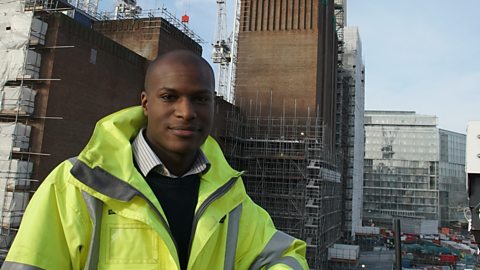
More from Bitesize Careers
Hear from young people about the world of work.
